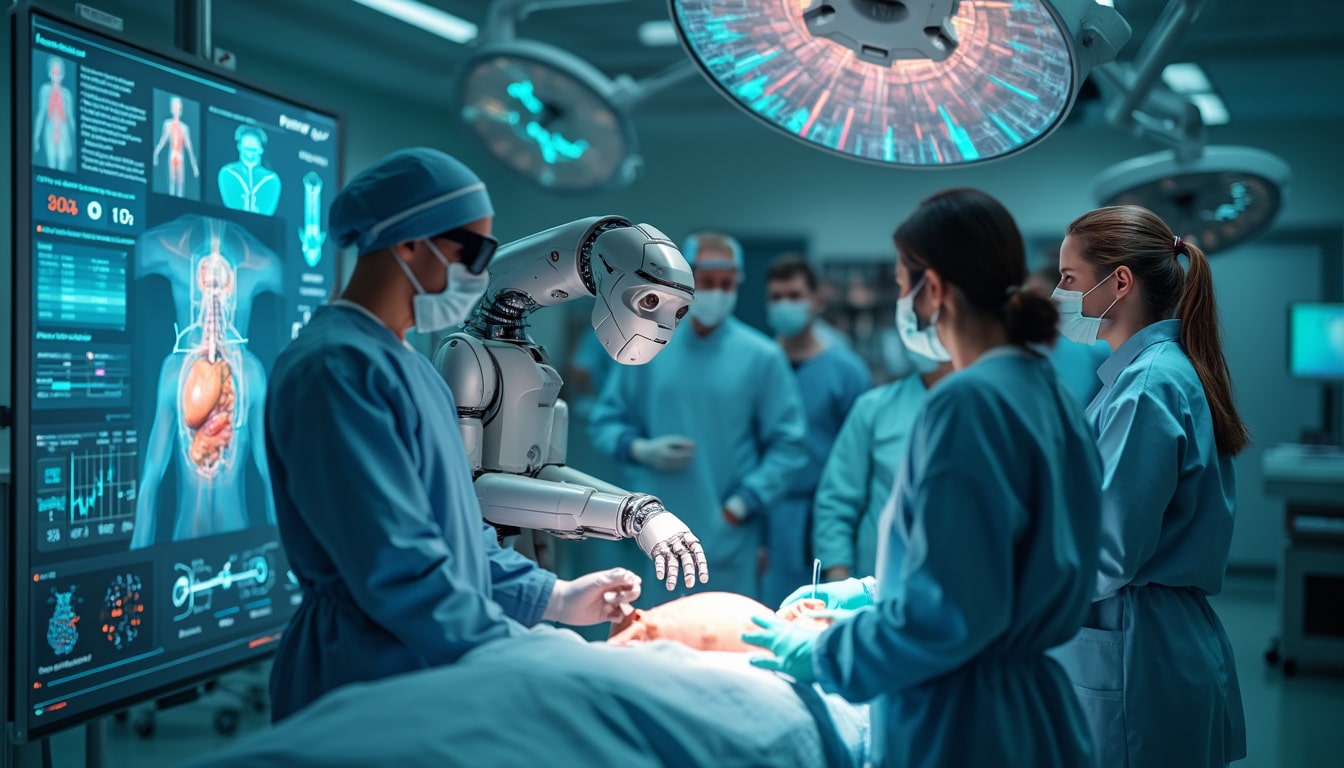Generative AI is rapidly revolutionizing the healthcare sector. More than half of healthcare organizations have already adopted these cutting-edge technologies. This digital transformation is redefining diagnostic and care standards.
Advancements in generative artificial intelligence offer unprecedented opportunities to enhance diagnostic accuracy and optimize administrative processes. According to a recent survey by McKinsey & Co., 85% of industry players are exploring or have already integrated these innovative tools. Health technology companies, insurers, and health systems are at the forefront, adopting these technologies at an impressive rate. Generative AI not only improves efficiency; it also creates value by reducing costs and enriching patient engagement.
Among the organizations surveyed, health technology and services (HST) groups show the highest adoption rate, reaching 57%. This early adoption allows them to benefit from improved clinical productivity and optimized administrative management. Care providers, although slightly lagging with a rate of 40%, show a growing trend to incorporate these advanced solutions into their daily practices.
Studies demonstrate that generative AI tools, such as OpenAI’s GPT-4 Turbo model, not only outperform diagnoses made by doctors but also surpass all other AI solutions developed over the past fifty years. This exceptional performance is achieved without prior medical training, paving the way for intelligent and autonomous assistance in diagnosing diseases.
Healthcare players are also leveraging generative AI to explore new avenues for value creation and cost reduction, despite ongoing challenges such as evolving regulations and skills gaps. Approximately 64% of organizations that have already implemented generative AI tools anticipate or have already quantified a positive return on investment, reflecting high expectations for this technology.
Many organizations are forming strategic partnerships to access external talent while customizing their AI solutions. Collaborations with hyperscalers are particularly valued to ensure successful implementation. Early use cases of generative AI focus on improving administrative efficiency, bridging IT gaps, and increasing clinical productivity. As technological capabilities evolve, other applications may extend to patient engagement and improvements in care quality.
#>
“`html
In a world of constant technological evolution, Generative Artificial Intelligence (generative AI) is positioned as a major transformative force, particularly in the healthcare sector. According to a recent survey conducted by McKinsey & Co., between 40% and 57% of organizations in the healthcare industry have already adopted generative AI tools. This growing adoption highlights not only the importance of this technology but also its potential to revolutionize various aspects of healthcare.
Table of Contents
ToggleWhat is Generative AI and How Does It Work in Health?
Generative AI is a branch of artificial intelligence that focuses on creating new content from existing data. In the healthcare sector, this technology allows for the generation of predictive models, analysis of vast medical data sets, and even the design of new treatments. For example, OpenAI’s GPT-4 Turbo model has demonstrated remarkable capabilities in diagnosing diseases with precision surpassing that of human doctors, without prior medical training.
This advancement is made possible by sophisticated algorithms capable of processing and learning from historical patient data. By integrating these systems into healthcare infrastructures, professionals can access decision-support tools that improve care quality and expedite diagnostic processes.
How Does Generative AI Enhance Medical Diagnostics and Treatments?
One of the most significant contributions of generative AI in health lies in improving medical diagnostics. By analyzing millions of medical records and identifying patterns invisible to the human eye, generative AI can accurately predict the onset of certain diseases. For example, a study conducted at Beth Israel Medical Center in Boston revealed that the GPT-4 Turbo model not only outperformed doctors in diagnostics but also surpassed all AI systems developed for healthcare over the past 50 years.
Furthermore, generative AI plays a crucial role in personalizing treatments. By taking into account the genetic specifics and medical histories of each patient, these systems can propose tailored therapies, thereby increasing success rates and reducing side effects.
What is the Impact of Generative AI on Administrative Management and Health Operations?
Beyond diagnosis and treatment, generative AI is also transforming the administrative management of healthcare facilities. Organizations use AI to automate repetitive tasks such as managing patient records, billing, and scheduling appointments. According to McKinsey’s survey, 64% of organizations that have already implemented generative AI tools anticipated or quantified a positive return on investment.
This automation not only reduces operational costs but also improves the efficiency of medical teams by allowing them to focus more on patient care. For example, some hospitals collaborate with technology partners like LIA Generative to develop customized solutions that meet the specific needs of their infrastructure.
What Are the Challenges and Ethical Considerations Related to Generative AI in Health?
Despite its numerous advantages, generative AI also raises several challenges and ethical questions. One of the main issues concerns data privacy. AI systems require access to vast medical data sets, which poses potential risks to patient privacy protection.
Moreover, the question of accountability in case of diagnostic errors remains complex. If an AI generates an error, determining liability between the algorithm developer and the healthcare professional can become a genuine legal headache.
To overcome these challenges, it is essential to establish robust governance frameworks. Partners like European Cloud Groups are investing in solutions that ensure ethical and secure use of generative AI, thereby ensuring responsible adoption of the technology in the healthcare sector.
What Are the Future Perspectives of Generative AI in the Healthcare Sector?
As generative AI continues to evolve, its applications in health are ever-growing. Initial uses focus on enhancing administrative efficiency and clinical productivity, but future prospects are even more ambitious.
Next steps could include deeper patient interaction through advanced medical chatbots, continuous improvement in care quality, and advancements in disease prevention through better data analysis. Moreover, collaborations between hospitals and technology companies, such as that between Estee Lauder and Adobe, demonstrate how the integration of generative AI can be strengthened through strategic partnerships.
However, the future success of generative AI will depend on a value-driven strategy, solid execution, and effective risk management. Industry leaders recognize the importance of AI risk management and governance to ensure the safe and beneficial implementation of these advanced technologies.
How Can Healthcare Organizations Maximize the Benefits of Generative AI?
To fully leverage generative AI, healthcare organizations must adopt a strategic and collaborative approach. According to the McKinsey survey, 61% of payers and providers plan to collaborate with external partners to develop their generative AI capabilities.
These partnerships not only allow access to external talents but also customize AI solutions according to the specific needs of each organization. For example, initiatives like the partnership between Dell and NVIDIA illustrate how technological collaborations can lead to successful implementations of generative AI.
Moreover, organizations need to invest in training and development of internal skills to ensure that their teams are prepared to effectively use and manage generative AI tools. By cultivating an innovation culture and emphasizing continuous training, healthcare facilities can ensure they remain at the forefront of technology and provide the best care possible to their patients.
What Are the Main Economic Benefits of Generative AI in Healthcare?
The adoption of generative AI presents numerous economic benefits for the healthcare sector. By reducing operational costs through the automation of administrative tasks and increasing clinical efficiency, organizations can achieve significant savings. According to the McKinsey survey, many organizations have already seen a positive return on investment from the implementation of generative AI.
Furthermore, generative AI helps reduce medical errors, which can lead to additional savings by preventing costs associated with incorrect treatments and complications. Additionally, by optimizing care processes and improving resource management, healthcare facilities can manage their budgets more effectively and allocate resources more strategically.
Partnerships with technology companies and investing in modern infrastructures, as shown by Deloitte, are essential to maximize these economic benefits. By adopting a proactive approach and integrating the latest technological innovations, healthcare organizations can not only improve their financial performance but also provide higher quality care.
How Does Generative AI Influence the Patient Experience?
Generative AI has a profound impact on the patient experience by making care more personalized, accessible, and efficient. Through advanced tools like medical chatbots and health tracking applications, patients can benefit from faster and more accurate access to medical information and personalized health advice.
For instance, AI systems can analyze a patient’s health trends over an extended period and provide proactive recommendations to prevent diseases before they manifest. This not only improves the quality of care but also enhances patient satisfaction and trust in healthcare services.
Additionally, generative AI allows for better appointment management and smoother communication between patients and healthcare professionals. Patients can easily schedule consultations, receive reminders, and access their medical records online, simplifying their care journey and reducing wait times.
Initiatives like those led by LIA Generative demonstrate how AI can be used to enhance the patient-provider interaction by offering innovative solutions that meet specific patient needs and improve their overall experience.
What Are the Most Promising Use Cases of Generative AI in Health?
Generative AI presents a multitude of promising use cases in the healthcare sector. Among the most notable are improving administrative efficiency, bridging IT gaps, and increasing clinical productivity. For example, automating patient records management frees up time for healthcare professionals, allowing them to focus more on direct patient care.
Another key use case is predictive analytics. By using advanced algorithms, generative AI can forecast epidemiological trends, anticipate medical resource needs, and optimize the management of medicine and medical supply inventories.
Moreover, generative AI plays a crucial role in medical research. By generating simulation models and analyzing complex data, it accelerates the discovery of new treatments and the development of innovative therapies. This contributes not only to improving health outcomes but also to reducing research and development costs.
How Do Technology Companies Support the Adoption of Generative AI in Health?
Technology companies play a vital role in facilitating the adoption of generative AI in the healthcare sector. By providing the necessary infrastructure, tools, and expertise, they enable healthcare organizations to fully leverage this innovative technology. For instance, Dell recently unveiled new PCs equipped with NVIDIA GPUs specifically designed for testing generative AI models, thus facilitating the development and implementation of advanced solutions.
Moreover, technology companies collaborate with healthcare facilities to develop customized solutions tailored to their specific needs. These partnerships help ensure a seamless integration of generative AI into existing systems and maximize the potential benefits of the technology.
The ongoing commitment of technology companies to research and development also ensures that generative AI solutions remain at the forefront of innovation, providing increasingly effective tools to address the emerging challenges in the healthcare sector.
What Are the Next Challenges to Overcome for Generative AI in Health?
As generative AI continues to establish itself in the healthcare sector, several challenges still need to be addressed to ensure successful and beneficial adoption. One of the main challenges is the seamless integration of AI into existing healthcare systems. This requires greater interoperability among different technological platforms and a standardization of processes to ensure smooth and effective use of generative AI.
Another major challenge concerns data management. Ensuring the quality, security, and privacy of medical data is crucial to maintaining the trust of patients and healthcare professionals. Organizations need to implement strict data management protocols and ensure that generative AI solutions comply with current regulations.
Finally, training and educating healthcare professionals on the use of generative AI is essential. It is crucial that medical teams understand how to use these tools effectively and ethically to maximize their benefits while minimizing potential risks.
By overcoming these challenges, the healthcare sector can fully harness the potential of generative AI to provide higher quality, more efficient, and more accessible care for all.
What Are the Success Stories of Generative AI in Health?
Many healthcare organizations have already demonstrated the tangible benefits of generative AI. For example, some insurance companies and health systems have successfully deployed generative AI tools that improve administrative efficiency and clinical productivity. These implementations have not only reduced costs but have also improved the quality of care provided to patients.
A notable case is that of Beth Israel Medical Center, where the GPT-4 Turbo model surpassed doctors in diagnosing certain medical conditions. This success demonstrates the potential of generative AI to radically transform traditional medical practices.
Additionally, successful collaborations between technology companies and healthcare facilities, such as those between Estee Lauder and Adobe to integrate generative AI, show how strategic partnerships can lead to significant innovations in the healthcare sector.
These success stories inspire other organizations to adopt generative AI and explore new ways to enhance their services, thus creating a virtuous circle of innovation and progress in the field of health.
How to Sign Up to Learn More About Generative AI in Health?
SUBSCRIBE TO OUR NEWSLETTER
Receive the latest news and analyses directly in your inbox.
To stay informed about the latest trends and innovations in generative AI in the healthcare sector, subscribe to our newsletter. Receive exclusive information, case studies, and in-depth analyses directly in your inbox.










